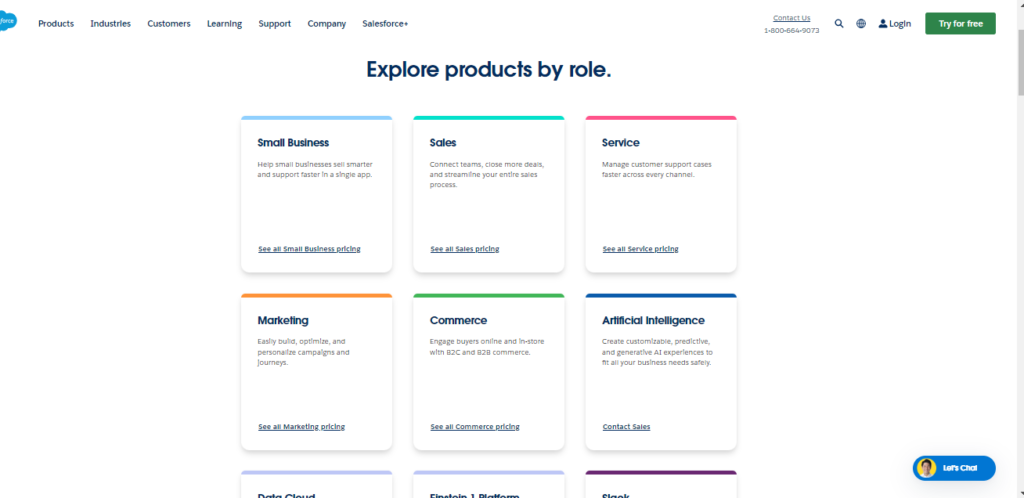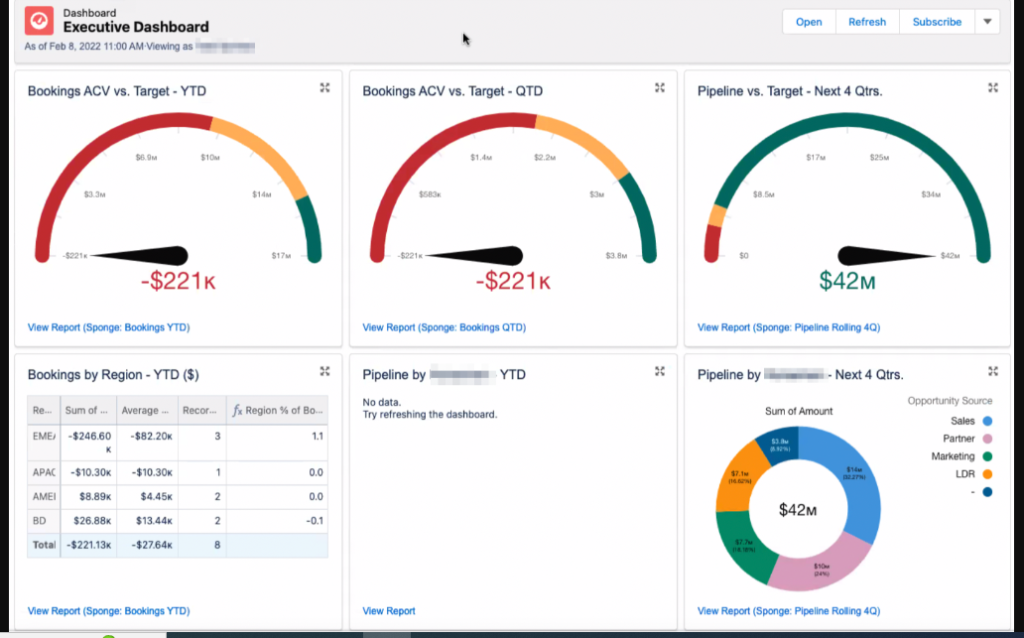Introduction
In this Salesforce Review 2024, we’ll explore whether Salesforce is still the best CRM for enterprises. Known for its powerful features and customization options, Salesforce has long been a top choice for large businesses. This review will cover its pricing, functionality, customer support, and more to help you decide if it’s the right CRM for your organization.
Pricing and Plans
Salesforce offers a variety of pricing plans tailored to meet the needs of enterprises, ensuring flexibility and scalability as businesses grow. The pricing structure is tiered, with different levels providing access to various features and functionalities. Here’s an overview of the main plans available for Salesforce in 2024:
| Plan Name | Monthly Cost (per user) | Key Features |
|---|---|---|
| Essentials | $25 | Basic CRM features, account and contact management |
| Professional | $75 | Advanced CRM features, sales automation, and reports |
| Enterprise | $150 | Customizable CRM, advanced analytics, and API access |
| Unlimited | $300 | All features, unlimited customization, and 24/7 support |
The Essentials plan is designed for small businesses, offering core CRM capabilities at an affordable price. The Professional plan expands on this with more robust features suitable for growing teams. The Enterprise plan is ideal for larger organizations needing extensive customization and integration options. Finally, the Unlimited plan provides access to all Salesforce features along with premium support, making it the best choice for enterprises that require comprehensive solutions.

It’s important to note that Salesforce frequently updates its pricing and features, so checking the official website for the most current information is advisable. Additionally, potential users should consider that while Salesforce may appear more expensive than some competitors, its extensive feature set and scalability often justify the investment, especially for enterprises looking to enhance their CRM capabilities.

Features and Functionality
Salesforce is known for its extensive features and functionality, making it one of the most powerful CRMs for enterprises. The platform offers robust tools for managing customer relationships, sales pipelines, and marketing efforts. Key features include:
- Sales Cloud: This feature allows teams to manage leads, opportunities, and customer interactions efficiently. It provides a complete view of the sales process from lead generation to deal closure.
- Service Cloud: Designed for customer support teams, Service Cloud helps manage and resolve customer inquiries across various channels, ensuring seamless service delivery.
- Marketing Cloud: Salesforce’s marketing automation tools enable businesses to run personalized marketing campaigns, track customer engagement, and analyze results.
- Analytics and Reporting: With powerful reporting tools, Salesforce allows teams to generate customized reports and dashboards, offering deep insights into sales performance, customer behavior, and more.
- Automation and AI: Salesforce incorporates AI through its Einstein AI, which helps teams automate tasks, forecast sales, and get predictive insights to optimize decision-making.
The platform is also highly customizable, allowing enterprises to tailor workflows, data fields, and processes to suit their unique needs.
These extensive features make Salesforce a comprehensive solution for managing complex customer relationships, but the platform’s depth may require a learning curve for new users.

User Experience and Interface
Salesforce offers a highly customizable and feature-rich interface, designed to meet the needs of large enterprises. However, the user experience can be complex, especially for first-time users. The sheer volume of tools and features available means there is a learning curve, but once mastered, Salesforce becomes an incredibly powerful tool for managing customer relationships and sales pipelines.
Salesforce’s interface is designed for scalability, allowing teams to tailor the dashboard to their specific needs. Users can easily add or remove modules, customize workflows, and integrate third-party applications, which makes it flexible but also somewhat overwhelming for smaller teams or businesses new to CRM systems.
One standout feature is the mobile app, which is intuitive and provides a similar experience to the desktop version. This allows sales teams to stay connected and manage their tasks on the go, boosting productivity.
Overall, while Salesforce’s user experience is not as simple as some of its competitors, its extensive customization options and powerful features make it a valuable CRM for enterprises looking for a tailored, robust solution.
Integration and Customization
Salesforce is renowned for its extensive integration and customization capabilities, making it a top choice for enterprises. As the best CRM for enterprises, Salesforce offers seamless integration with thousands of third-party applications, including popular tools like Slack, Google Workspace, and Microsoft Office. This makes it easy for businesses to connect their existing tools and streamline their operations.
Customization is another area where Salesforce shines. Enterprises can tailor the CRM to fit their specific needs, whether it’s customizing dashboards, automating workflows, or creating personalized reports. Salesforce’s AppExchange marketplace offers thousands of apps and add-ons, allowing companies to expand functionality as needed. For those with development teams, Salesforce provides the ability to create custom applications using its platform, giving businesses full control over how they use the CRM.
Salesforce’s integration and customization options ensure that it can adapt to the unique requirements of any enterprise, helping companies improve efficiency and productivity.
Customer Support and Resources
Salesforce offers a comprehensive customer support system, crucial for large enterprises managing complex sales operations. One of its key strengths is the variety of support options available, which ensures that users have access to help when they need it. Salesforce provides 24/7 support through its extensive help center, including a knowledge base with articles, FAQs, and how-to guides. Additionally, users can access live chat, email, and phone support depending on their service plan.
For enterprises that require more personalized assistance, Salesforce offers premium support plans like Premier and Signature, which include faster response times, technical account management, and proactive monitoring. These support levels are ideal for businesses that rely heavily on Salesforce for critical operations and need dedicated support to prevent disruptions.
Salesforce also has a strong community, where users can ask questions, share tips, and get advice from both Salesforce experts and other users. The Trailhead platform, a self-paced learning hub, is another valuable resource for users looking to improve their skills and make the most of Salesforce’s features.
Overall, Salesforce’s customer support and resources are designed to meet the needs of enterprises, offering a range of solutions from self-help resources to advanced, personalized support plans.
Pros and Cons
When evaluating Salesforce as a potential CRM for your enterprise, it’s important to consider both its strengths and weaknesses. Below is a concise breakdown of the pros and cons to help you make an informed decision.
| Pros | Cons |
|---|---|
| Comprehensive Features: Salesforce offers a wide range of features, including advanced analytics, lead management, and automation tools, making it suitable for complex sales processes. | High Cost: Sales force can be expensive, especially for smaller businesses or those with limited budgets. Additional costs for add-ons can also accumulate. |
| Scalability: Designed to grow with your business, Sales force easily scales to accommodate expanding teams and increased data volume. | Steep Learning Curve: The extensive features can be overwhelming for new users, requiring significant training and onboarding time. |
| Customizability: Sales force provides extensive customization options, allowing businesses to tailor the platform to their specific needs. | Performance Issues: Some users report slow loading times and performance lags, particularly with large datasets. |
| Strong Integration Capabilities: Sales force seamlessly integrates with various third-party applications, enhancing its functionality. | Complexity: The vast array of features may lead to complexity, making it challenging to use for teams that need a straightforward CRM. |
| Robust Customer Support: Sales force offers various support options, including extensive documentation, community forums, and live support. | Frequent Updates: While updates can improve the platform, they can also lead to temporary disruptions and require users to adapt to new features. |
Overall, Sales force is a powerful CRM for enterprises, but it’s essential to weigh these pros and cons based on your organization’s specific needs and resources.
Conclusion
Sales force remains one of the most robust and versatile CRMs available for enterprises in 2024. Its wide range of features, powerful customization options, and extensive integration capabilities make it a top choice for businesses with complex needs. While it may come with a higher price tag and a steeper learning curve, its scalability and the level of customer support provided ensure that Sales force continues to be a reliable solution for large organizations.
If your business requires a comprehensive, enterprise-level CRM to streamline operations and drive growth, Sales force is definitely worth considering.

